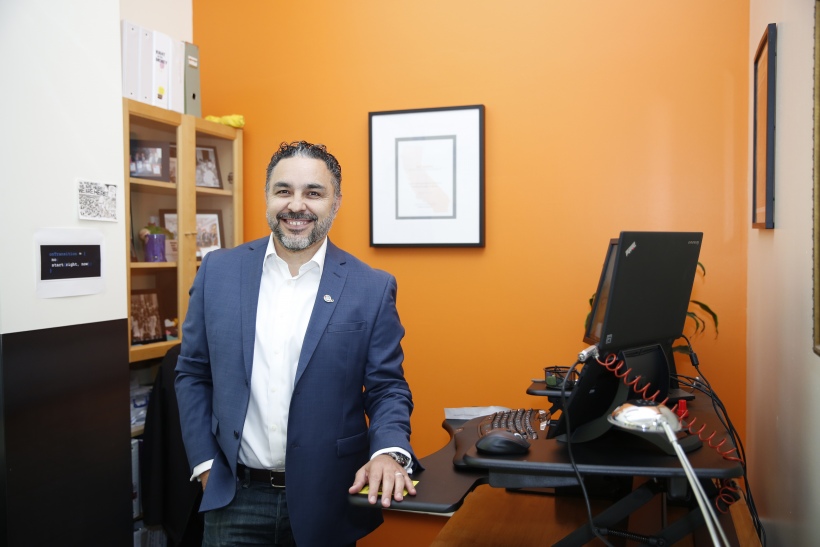News
From the newsletter: Out of the Shadows, Into the Financial System

Jose Quinonez at his office in San Fransisco. (photo courtesy of: John D. & Catherine T. MacArthur Foundation)
In today’s economy, it takes a credit score to do just about anything—rent an apartment, buy insurance, and, in some cases, even get a job.
This, according to José A. Quiñonez PP ’93 and his organization Mission Asset Fund (MAF), is a major barrier for many low-income and immigrant communities in participating fully in the U.S. economy. Seven percent of families in the U.S. don’t have access to a checking or savings account, and one adult out of every in five is “credit-invisible.” Many such families rely on predatory payday loans and check-cashing services, resulting in a cycle of debt that is hard to break.
To help people get out of the financial shadows, Mr. Quiñonez founded MAF in 2007. The San Francisco-based non-profit works with community lending circles to report repayment to formal financial institutions. For his work with MAF, Mr. Quiñonez received a MacArthur “Genius Grant” Fellowship in September 2016.
While developing the programs at MAF, Mr. Quiñonez wanted to think differently about the communities he was intending to serve. “Instead of looking at people from a deficit perspective of how broken or how ignorant they are—the way we typically think about poor people—we rejected that notion and that viewpoint,” he says. “Instead, we developed programs and services based on what we called a strength-based approach. We’re looking at what is good and true in people’s lives, looking at what is really working in their communities, and starting the conversation from there. That approach led us to highlight this age-old tradition of people of lending and saving money together.”
Lending circles or rotating credit associations, a traditional cultural practice in Latin America, Asia, and Africa, allow communities to pool their resources and distribute loans to one another. MAF formalizes the process by acting as the loan servicer, collecting promissory notes, and reporting the repayments to the credit bureaus. The organization also requires circle members to establish checking accounts and go through banks to transfer funds to each other.
“Through the reporting to the bureaus we’re helping people build and improve their credit scores—so there’s a very real and tangible benefit that were providing people through our lending circle program,” said Mr. Quiñonez. “But the conversation doesn’t end there. We help people better manage their money and unlock a world of opportunities in the financial mainstream.”
By establishing a credit history, MAF participants are able to gain access to credit cards and apply for mortgages. Mission Asset Fund has facilitated more than 6,000 loans totaling $6.2 million in 18 different states. On average, participants’ credit scores rise by 168 points, and they reduce their debt by $1,000. The default rate on MAF loans is 0.7 percent.
“The true impact of our work is not just for our individual clients, but when we challenge those assumptions or the framework that has led to the failed policies in terms of how to work with low income people,” says Mr. Quiñonez. “I want to lift up our learnings: how, through our strength based approach, we are in fact creating successful programs and how can that approach be applicable to other areas of policy. How can we do that with housing? With health? With insurance? And other sorts of areas where we have programs to help poor people, but, because they’re based on flawed assumptions, those projects never end up working. So we’re trying to inspire other fields to rethink their policies.”
Mr. Quiñonez says his time as a WW Public Policy Fellow laid the groundwork for his career. “Because of my Fellowship,” he recalls, “I was able to go onto the Woodrow Wilson School [of Public Policy at Princeton University]. And the Woodrow Wilson School is really where I learned some of the key concepts that I’m instituting now in lending circles.”
This notion of looking for the best in people is something Mr. Quiñonez sees in society as a whole: “We have this incredible tradition in our society of being generous, of really investing in people to unlock their full human potential. I think the Woodrow Wilson Fellowship that I did in 1993 was an example of that,” he notes. “Here was the benevolent community coming together to invest in students of color and promote public policy careers. I think it’s been one of the most successful Fellowships, because there is now this very large cadre of people of color in public policy careers. Everywhere I go, I am assured that there will be a professional of color in a public policy job and it’s all due to the pipeline being created. This is one of the examples of success that our community needs to know about. I was fortunate to be a part of that pipeline, to have that experience, but we have to make sure that that doesn’t get closed up for the next generation.”
###
This story appeared in the fall/winter 2016 issue of Fellowship, the newsletter of the Woodrow Wilson Foundation. To see the full newsletter, click here.

